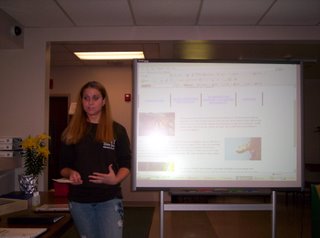
Before you continue on with Unit One, review this additional Georgia Performance Standard that you will address:
ELAALRL5 The student understands and acquires new vocabulary and uses it correctly in reading and writing.
5. Post the following to your blog: What new vocabulary have you used in this unit already? What do these new terms mean to you?
Another Mini-Lesson:
Why did Ben Franklin fly a kite in a lightning storm? Because he wanted to have an explanation for what lightning was; he didn't accept the Puritan notion that God was responsible for everything, and people were not supposed to concern themselves with such things. This was the prevailing idea of the 18th century (the 1700s) in America, sometimes called the
Age of Reason, or the
Age of Rationalism.
This philosophy started in Europe almost one hundred years before it became popular in America. You probably recognize names like Sir Isaac Newton, who used science instead of religion to explain gravity. Like Newton, Rationalists in America wanted to achieve order and explaination of the natural through science. People sought to become more educated in Mathematics, Astronomy, Botany, and Biology. Collecting fossils and plants, and peering into microscopes and telescopes became much more popular than studying the scripture.
It was during this time that many people's notion of God changed from the vengeful God in Johnathan Edwards'
Sinners in the Hands of an Angry God, to a more humanitarian God. A popular religious movement of the time was
Deism, which was a body of ideas that did not revolve around a church itself. It was a faith based on science and mathematics. Deists believed in God, but not as a power that controlled everything. They believed that God created the universe, but left it up to the people to figure out how to work it, or to figure out the natural laws.
Rationalist Men and Women also believed that human society was run by natural law. If people were able to discover and understand these laws, they would be able to improve their lives. While improvement was important to the Puritans, they pleaded with God for it, and the rationalists believed they could take a scientific approach to self-imporvement.
A Rationalist would believe that anything could be understood through science. Puritans thought this to be an insult to God since they believed humans had no business deconstructing God’s work. Think of the on-going debate over the theory of evolution, and you will have a pretty good picture of how the Puritans and the Rationalists differed.
Many of the doucments upon which our country was founded were penned by Rationalists. For instance,
The Declaration of Independence makes reference to
certain unalienable rights that everyone had. Puritans would have believed that God decided who had certain rights, and that some people did not have as many as others. It is interesting to see
what happened to the men who signed the declaration.
Work Period:
5 (continued) -- add to your list of vocabulary now that you have read about the Rationalists. You should have around five new terms with your own definition for each.
6. Briefly
(one good paragraph) describe the differences between the Puritans and the Rationalists. Please be careful not to repeat the same words you have read in this entry. Where in today's society do you see some of the ideas you have read about here represented?. (Hint --
check this out, especially the comments section.)
7. Read the excerpt from
The Autobiography by Benjamin Franklin in the red American Literature book. Pay special attention to the efforts Franklin made to improve his life.
Give one example from The Autobiography of how Franklin is a good example of a rationalist. Make sure you explain why, and provide an example straight from the text.
8. If you were to make a list of thirteen virtues to improve upon in your life, what would they be? List them the way Franklin did. There are a couple more good examples
here. Do you think you could reach moral perfection in this way? Explain how you feel.
This should be a paragraph or two.
Closing:
9. This unit has addressed the following Georgia Performance Standards:
ELAALRL1 The student demonstrates comprehension by identifying evidence (i.e., examples of diction, imagery, point of view, figurative language, symbolism, plot events and main ideas) in a variety of texts representative of different genres (i.e., poetry, prose [short story, novel, essay, editorial, biography], and drama) and using this evidence as the basis for interpretation.
ELAALRL3 The student deepens understanding of literary works by relating them to their contemporary context or historical background, as well as to works from other time periods.
please take a moment to specifically address how the work you did in this unit addresses these standards. You should provide evidence from your own work to illustrate what you claim.















